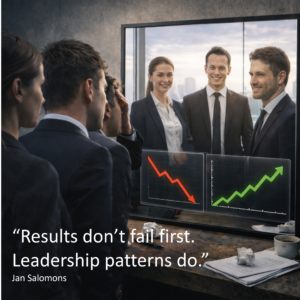Beyond being busy: how leaders can reclaim focus and purpose

Why time management isn’t the solution — and what really matters instead
How does your morning usually start? Scanning your inbox just before the first meeting begins, or catching up on yesterday’s leftovers? Time always seems to slip through our fingers. You can save or invest money, but time works differently. Every minute that passes is gone forever — every day not spent with intention is a day you can’t get back. Still, most leaders feel they never have enough of it.
I’ve seen this across industries and roles: managers struggling to “manage time.” It’s one of the top three requests in leadership programs. We try to fix it by stretching our schedules — working longer, checking messages late at night, filling weekends with catch-up tasks. The paradox is clear: the more efficiently we work, the busier we become.
The illusion of being busy
We think we’re busy because there’s too much to do — at work and at home. Our inbox fills faster than we can clear it, meetings pile up, and life outside of work adds its own demands. But being busy is often not the real problem; it’s a symptom of deeper habits and beliefs.
Being busy is the easy option
It takes courage to pause. Busyness gives us the illusion of progress. We let the environment — emails, meetings, messages — decide our priorities. Doing feels easier than thinking. In that sense, being busy is often a subtle form of laziness: we move fast without asking why.
Being busy is avoiding
When faced with something complex or emotionally demanding, we often choose smaller, easier tasks instead. It gives us a sense of accomplishment but keeps us from the work that truly matters. Busyness becomes a distraction from discomfort.
Being busy is a personal brand
Many professionals wear busyness like a badge of honor. If you’re always in motion, you must be important — or so the story goes. In competitive workplaces, “being busy” becomes a signal of value and ambition.
Being busy is a habit
Every time we tick off a task, dopamine rewards us. Add technology, and this loop never stops: messages, updates, notifications — endless stimuli that keep us craving small wins. We become addicted to motion, not meaning.
Being busy is what everyone does
Busyness is the new normal. It gives a sense of belonging: everyone else is busy, so we are too. But following the crowd doesn’t mean we’re moving in the right direction.
What being busy really delivers
When we live in a constant state of motion, we pay a high price: exhaustion, declining creativity, and deteriorating relationships. We also confuse activity with achievement. Time management only feeds this pattern — we become more efficient, but not more effective. The time we “save” is often filled with more of the same.
In leadership development, I often meet managers who feel trapped in what they call “the hamster wheel.” They work harder, but not smarter. In VUCA environments — volatile, uncertain, complex, and ambiguous — this pattern accelerates. Leaders try to control time as the world speeds up around them. But the problem isn’t the clock. It’s clarity.
True success isn’t about working longest hours. It’s about knowing when to focus, when to reflect, and when to let go. Time management helps you fit more in; focus management helps you find meaning in what matters.
From being busy to being focused
To move beyond busyness, we need to shift from time orientation to attention orientation. The question isn’t, “How do I manage my time?” but “What deserves my attention right now?”
This aligns with what I wrote earlier in Manage yourself to manage time. Managing time starts with managing yourself — your focus, your boundaries, and your energy. The key is to reconnect with purpose and reframe productivity as impact, not effort.
As Tony Crabbe writes in Busy: How to Thrive in a World of Too Much, there are four essential strategies to move beyond busyness:
- Mastery – regain a sense of control over your life. Set clear boundaries to protect your focus and energy. Choose where to engage, instead of reacting to everything.
- Focus – in a world of too much, success isn’t about doing more; it’s about making an impact. Choose fewer things and do them deeply.
- Engagement – busyness disconnects us from people and values. Reconnect with what truly matters — conversations, learning, creativity, relationships.
- momentum – make change visible. Even small steps toward balance build confidence and energy to sustain new habits.
A VUCA perspective
In a VUCA world, “being busy” feels safe — it gives a false sense of control. But in reality, it limits adaptability. Volatility and uncertainty demand reflection, not reaction. Complexity requires collaboration, not competition. Ambiguity calls for curiosity, not speed.
When leaders slow down, they create space for awareness and better choices. They start to see instead of just do. In my coaching practice, I’ve witnessed how teams transform when they stop chasing time and start managing focus together. The shift from “more” to “meaning” is what builds resilience — both individually and collectively.
Reflection for leaders
Where in your daily rhythm does busyness replace real focus? What would change if you replaced “I don’t have time” with “It’s not my priority”?
Work with me
In my coaching and leadership programs, I help leaders and teams shift from busyness to clarity — learning to lead with attention, not speed. Together we explore how to focus on what matters most, create rhythm, and build resilience in a VUCA world.




